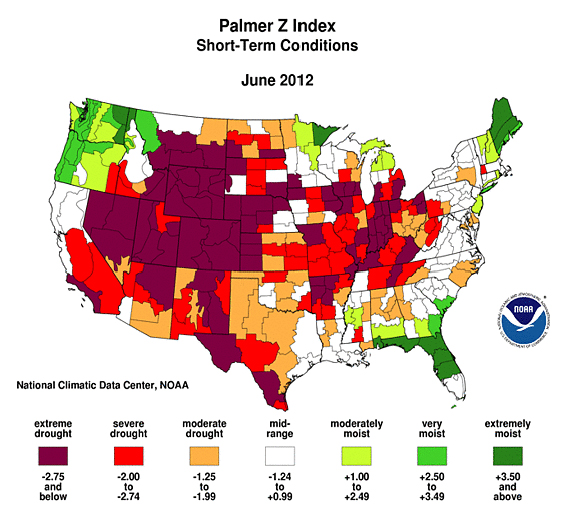
Drought has created a standoff over water supplies in the U.S. Midwest between energy producers and farmers, reports Bloomberg. Natural gas and oil producers have been forced to seek new water sources as they mull calls from farmers and activists to recycle their water, a practice that would make ‘fracking’ more expensive.
Already hugely controversial, hydraulic fracturing, or fracking as its become known, exploits fossil fuel deposits by busting up shale rock using a potent combination of water, chemicals, and sediment. The practice, largely controversial for its use of toxic chemicals and its link to small earthquakes, also requires millions of gallons of water per well. But water is becoming scarce in many parts of the central U.S., leading activists and regulators to argue that energy companies should be recycling water to lessen strain on resources.
The U.S. has seen a natural gas boom in the last few years largely due to fracking. The trend has pushed coal aside as the top energy source in the U.S. and helped lower the nation’s carbon emissions slightly, since natural gas produces less carbon than coal per unit. However, critics contend the practice, which has few regulations attached to it, comes with too many environmental and health risks. In addition, recent research has shown that natural gas is hardly climate friendly due to potential methane emissions, a greenhouse gas more potent in the short-term than carbon.
Some climatologists have linked the current drought, the worse in the U.S. in the past 50 years, to climate change, noting that such droughts are expected to become worse and more common in parts of the U.S. as the globe heats up. In fact, a study earlier this month found that climate change had increased the probability of a crippling drought in Texas last year by 20 times. It may be that the primary contributors to climate change–fossil fuel producers–will also have to deal with its ramifications.
Related articles
Featured video: climate change bringing on the extremes
(07/24/2012) Focusing on extreme weather events in the U.S. this summer, a new compilation video highlights the connection between climate change and increasing and worsening extremes, such as heatwaves, droughts, and floods.
U.S. drought could set in motion global food crisis
(07/23/2012) The U.S. is suffering drought levels not seen in over 50 years—and drawing comparisons to the Dust Bowl—with 56 percent of the contiguous U.S. in moderate to extreme drought. Some experts fear that the drought, and resulting hikes in food prices, could propel another global food crisis like those seen in 2008 and 2010.
Drought, heat, fires push more Americans to accept reality of climate change
(07/19/2012) Record temperatures, wildfires, drought, and crop failures have is helping convince more Americans that climate change is real and occurring, reports Bloomberg.














